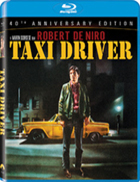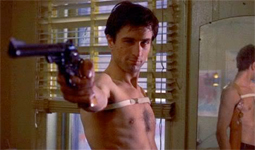| Director: Martin Scorsese | | Screenplay: Paul Schrader | | Stars: Robert De Niro (Travis Bickle), Jodie Foster (Iris), Cybill Shepherd (Betsy), Harvey Keitel (Sport), Albert Brooks (Tom), Leonard Harris (Charles Palantine), Peter Boyle (Wizard), Steven Prince (Andy), Harry Northup (Doughboy), Martin Scorsese (Passenger) | | MPAA Rating: R | | Year of Release: 1976 | | Country: U.S. |  |
|  There have been few films that have created and sustained the sense of constant, underlying dread that pervades every frame of Martin Scorsese’s scorching urban masterpiece Taxi Driver. It slowly and almost unbearably builds in tension until it literally explodes in a bloody climax of vigilante violence that was unlike anything viewers had seen before. Scorsese’s superb direction—so confident, so intense in its mixture of classical Hollywood tropes and various European new wave stylistics—coupled with Robert De Niro’s searing performance in the title role, Paul Schrader’s relentless script, and Bernard Herrman’s pounding orchestral score ensured something unique and memorable, terrifying and disturbing. The film shows us the sordid underbelly of New York City through the increasingly psychotic eyes of Travis Bickle (De Niro), a lonely Vietnam veteran who is unable to comprehend the society in which he lives. A loner cut adrift from the world, he is the epitome of alienation, constantly (and often pathetically) trying to connect with others, but always failing. The film forces us into Bickle’s discomfiting subjectivity: We are always with him, listening to his inner thoughts as he pours them out into a diary no one will ever read; seeing the city’s crime and poverty through his ravaged, wandering eyes; and watching him talk to himself in the mirror, enacting delusional tough-guy roles and practicing confrontation. Scorsese spares nothing in his portrait of a city at war with itself. Bickle is a sick man, but the irony is that he is only as sick as the world around him. Captured with documentary-like realism, Taxi Driver’s New York City is a dank and squalid netherworld, its garish neon signs and dull street lamps illuminating only drug dealers and prostitutes moving amongst gaseous clouds of steam that escape through manholes in the wet streets. We understand Bickle’s perverse fascination with and hatred of the sinful and defiled around him, and the film’s tension emerges from our growing realization that it will eventually push him over the edge. Bickle takes a job driving taxicabs because he can’t sleep at night. He doesn’t care what time of night he drives, what neighborhoods he drives through, or who his fare is. His backseat is constantly filled with the dregs of society, whether it be a politician picking up a prostitute, or a deranged, homicidal husband stalking his adulterous wife (played by Scorsese himself in a particularly creepy role). At the end of the night, Bickle wipes the blood and semen off the back seat and returns to his small, seedy apartment with only his thoughts as company. He is never able to fully communicate with anyone except himself, which is why his thoughts must finally erupt in violence. There is simply no other way to let them out. This is not to say that Bickle does not try to take part in the “normal,” acceptable aspects of society, which is expressed most clearly through his attraction to Betsy (Cybill Shepherd), a pretty young woman who works in the campaign office of a Presidential candidate. When things don’t work out with her, Bickle develops an intense obsession with a 12-year-old prostitute named Iris (Jodie Foster). He is not interested in her sexually; rather, he wants to save her, to liberate her from the life in which she is currently enslaved. When he tries to persuade her to get away from her abusive pimp, Sport (Harvey Keitel), he finds that, much to his dismay, she doesn’t want to leave the life—yet another moment of misunderstanding and miscommunication. Nevertheless, Bickle decides that he will be her savior, even if she doesn’t want him to, and what ensues is a gruesome bloodbath in which Bickle becoming an armed vigilante, determined to rescue Iris from the forces around her. Scorsese’s depiction of Bickle’s violent eruption is frightening in its intensity, unadorned with nondiegetic music or unnecessary flourish. We are drawn into the maelstrom, an unfolding nightmare in which we are willing participants, and we are detached from Bickle only after it is over and an extreme high-angle tracking shots surveys the aftermath. The key to Taxi Driver is that it does not end there, but rather continues with a denouement that shows the unexpected and somewhat shocking results of Bickle’s vigilante rampage. It is a final, ironic, yet strangely understandable twist in a film that has otherwise been a straight descent, taking us from a surface world of crime and corruption into the perverse worldview of a self-appointed vigilante and then back again, in the process creating one of the most unnerving portraits of (anti)heroism ever committed to film. | Taxi Driver 40th Anniversary Blu-Ray + Digital | | | Aspect Ratio | 1.85:1 | | Audio | English DTS-HD Master Audio 5.1 surroundCzech Dolby Digital 5.1 surroundFrench Dolby Digital 5.1 surroundGerman Dolby Digital 5.1 surroundHungarian Dolby Digital 5.1 surroundItalian Dolby Digital 5.1 surroundJapanese Dolby Digital 5.1 surroundPolish Dolby Digital 5.1 surroundPortuguese Dolby Digital 5.1 surroundRussian Dolby Digital 5.1 surroundSpanish Dolby Digital 5.1 surround | | Subtitles | English, English SDH, French, German, Italian, Japanese, Portuguese, Spanish, Czech, Danish, Dutch, Finnish, Greek, Hungarian, Korean, Mandarin (Traditional), Norwegian, Polish, Swedish, Turkish | | Supplements | “Taxi Driver Q&A” with Martin Scorsese, Robert De Niro, Jodie Foster, Paul Schrader, Cybill Shepherd, Michael Phillips, and Harvey Keitel hosted by film critic Kent Jones at the 2016 Tribeca Film FestivalInteractive “Script to Screen” featureAudio commentary by director Martin Scorsese and writer Paul SchraderAudio commentary by film scholar Robert KolkerAudio commentary by writer Paul ScraderMaking Taxi Driver documentary“Martin Scorsese on Taxi Driver” featurette“Influence and Appreciation” featurette “Producing Taxi Driver featurette “God’s Lonely Man” featurette “Travis’ New York Locations” featurette “Storyboard to Film Comparisons” with a Martin Scorsese introduction “Taxi Driver Stories” featuretteAnimated photo galleries | | Distributor | Sony Pictures Home Entertainment | | SRP | $19.99 | | Release Date | November 8, 2016 | | | VIDEO & AUDIO | | As far as I can tell, the video and audio transfers on this 40th Anniversary Blu-ray are the same that we saw five years ago on the 35th Anniversary release, which is still the best I have ever seen it (and I have seen this film in just about every format imaginable—35mm, 16mm, laser disc, VHS, and DVD). The presentation is based on a 4K restoration supervised by director Martin Scorsese and cinematographer Michael Chapman, resulting in a beautifully rendered image that is free of any nicks, scratches, dirt, or other age artifacts. The picture looks very filmlike, with a sometimes heavy presence of grain that is the result of printing processes used to darken portions of the image, particularly the final shoot-out. While the daytime scenes are bright and sharp, most of the film takes place at night or inside dark buildings, so expect a frequently dim, slightly muddy image that is inherent to the look of the film. Colors look strong and natural except when purposefully desaturated. The DTS-HD Master Audio 5.1-channel surround soundtrack is also very good, with excellent separation across the main soundstage and plenty of activity in the surround channels to immerse you in both the seedy hustle and bustle of New York at night and Bernard Herrmann’s instantly iconic musical score. | | SUPPLEMENTS | | The only new supplement included on this 40th Anniversary edition is a 42-minute Q&A with Martin Scorsese, Robert De Niro, Jodie Foster, Paul Schrader, Cybill Shepherd, Michael Phillips, and Harvey Keitel hosted by film critic Kent Jones that was recorded live at the Beacon Theatre in New York City at the 2016 Tribeca Film Festival. It begins with festival cofounders De Niro and Jane Rosenthal introducing a screening of the film, and is then following by a lengthy question-and-answer session with the panelists. Otherwise, all of the supplements are the same as we had on the 35th Anniversary Blu-ray from 2011, starting with the only supplement that was new to that release, a “Script to Screen” feature that allows you to read Schrader’s original script while watching the film. The script, which you can read either side-by-side with a reduced film frame or as a frame-within-the film frame, scrolls automatically to stay in synch with the film itself. The rest of the supplements have been culled from just about every other video incarnation of Taxi Driver, going back to Criterion’s 1986 laser disc, from which we have an audio commentary by director Martin Scorsese and writer Paul Schrader. There are also two other audio commentaries, one by film scholar Robert Kolker, author of A Cinema of Loneliness, and a solo track by Schrader. From the 1999 DVD we have Making Taxi Driver, a comprehensive, feature-length documentary about the film’s production. Also included are half a dozen featurettes from the 2007 two-disc DVD set. “Martin Scorsese on Taxi Driver” is an 18-minute interview with the director; in “Influence and Appreciation,” Robert De Niro, Oliver Stone, Roger Corman, and cinematographer Michael Chapman discuss Scorsese’s unique artistry and impact on filmmaking; “Producing Taxi Driver features producer Michael Phillips and covers the circumstances under which the film came to be made; “God’s Lonely Man” focuses primarily on Schrader, his process of writing the script, and the theme of loneliness; “Travis’ New York Locations” features interviews with former mayor Ed Koch about the state of New York City in the mid-1970s; and “Taxi Driver Stories” relates actual tales told by real-life New York city cab drivers, many of whom were working when the film was released. Also included is a series of “Storyboard to Film Comparisons” with an introduction by Scorsese and a set of animated photo galleries that include photo montages featuring the film’s music score, location shots taken during filming and Scorsese at work, and various marketing and promotional images. |
Copyright © 2016 James Kendrick Thoughts? E-mail James Kendrick All images copyright © Sony Picture Home Entertainment |




 (4)
(4)

